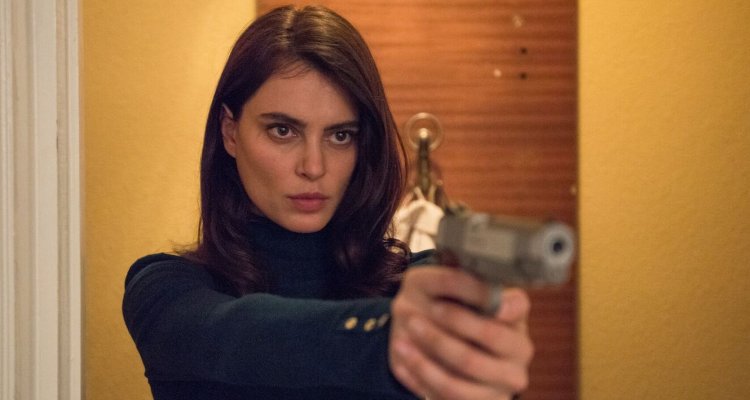Since the Palme d’Or win for “4 Months, 3 Weeks and 2 Days” in 2007, New Romanian Cinema has been a fixture at film festivals. The work of filmmakers like Cristian Mungiu, Calin Peter Netzer and Cristi Puiu has also picked up a reputation for being particularly dour in its realism; the exceptions to the rule are the dryly humorous films of Corneliu Porumboiu. With his latest effort “The Whistlers”—Porumboiu’s first feature to break into the Main Competition of the Cannes Film Festival—the director sets himself further apart from the fellow countrymen by injecting a comedy with pronounced noir influences. This comedic thriller is witty and diverting without selling out on the Romanian reputation of thoughtful, challenging work.
READ MORE: 2019 Cannes Film Festival: The 21 Most Anticipated Movies
Romanian cop Cristi (Vlad Ivanov) is in too deep, unwittingly finds himself at the center of 30 million euro theft. He is summoned to La Gomera, one of the Canary Islands, at the behest of a local gangster. His mission, should he choose to accept it (well, there really isn’t much of a choice); he must learn ‘el silbo’—a local whistling language disguised as birdsong—to avoid surveillance and spring the man responsible for the heist from police custody. Ushering Cristi into this underworld is the mysterious Gilda (Catrinel Marlon), a knockout femme fatale with her own angle on the scheme.
READ MORE: the 100 Most Anticipated Films Of 2019
“The Whistlers” takes up the thorniest traits of the classic film noir by choice. Graphic cards break up the film into episodes, each introducing or fleshing out one of the intrigue’s central players. To comprehend “The Whistlers” is like trying to make heads or tails of “The Big Sleep”; the plot of the film is convoluted and contradictory, changing shape unpredictably with each new chapter. Numerous flashbacks are unlabeled and demand the viewer’s rapt attention to decode. It may not be the most efficient way to present the story, but it’s certainly in keeping with the playfulness of Porumboiu’s earlier work.
READ MORE: Summer Movie Preview: 35 Films You Shouldn’t Miss
Between his roles in the work of Mungiu and international co-productions such as “Toni Erdmann,” Ivanov has become the default for producers looking for a Romanian star. “The Whistlers” offers the seasoned actor something new to chew on while still making the most of his iconic stone-faced visage. Often pigeonholed as a figurehead of bureaucracy or corruption, he’s a game comedic performer with a leading-man presence; maybe not the next 007, but there’s undoubtedly more to the actor’s talent than Bond villain typecasting.
READ MORE: The 25 Best Films Of 2019 We’ve Already Seen
Sure to get lost in all the double-crossing and betrayal, “The Whistlers” is, in fact, a sequel to 2009 minor masterpiece “Police, Adjective.” The main intersection between the two films is the figure of Cristi; the character moves to the foreground of “The Whistlers” after a supporting but unforgettable contribution in the first entry as a no-nonsense police captain with a penchant for sophistry. The other links between the two works are intriguing—approaching spoiler territory for the vocal few “Police, Adjective” diehards—but Porumboiu approaches the character with a clean slate, transplanting him into a wildly different set of circumstances.
“The Whistlers” makes the most of the 2.35:1 widescreen format from the stunning first shots of the Canary Islands’ cliff faces. Previously working together on “The Treasure” and last year’s documentary “Infinite Football,” cinematographer Tudor Mircea captures the island of La Gomera in all its astonishing beauty, replete with palm trees, beaches, and relentless sunshine. It’s a visual vacation from the cement apartment buildings, and cloud cover of Bucharest one is accustomed to from New Romanian Cinema. Nighttime passages are painted with low-key lighting to the heighten the film noir atmosphere.
The soundtrack gives “The Whistlers” an extra punch, with Iggy Pop’s “The Passenger” opening track as a well-aimed track used to ignite the action. Music, like the arrangement of the story and the espionage tropes, serves as another method of Brechtian disruption; tunes start and stop abruptly in the grand tradition of Jean-Luc Godard. Music is also a recurring gag; the concierge at the aptly-named Hotel Opera keeps classical compositions playing in order to educate the patrons better. Then there’s the whistling itself, mixed piercingly high into the soundscape.
Free from the burden of critiquing Romania’s society, Porumboiu is able to drop the bureaucratic baggage and play with structure and genre tropes. As was the case with “The Treasure,” money serves to drive the plot rather than take on a value of its own, and here it is genre itself that the filmmaker interrogates with the loot. Cristi’s liberating trip abroad in “The Whistlers” expands the horizons of New Romanian Cinema, offering up a sequel to social realism just as it began to get stale. [A-]

